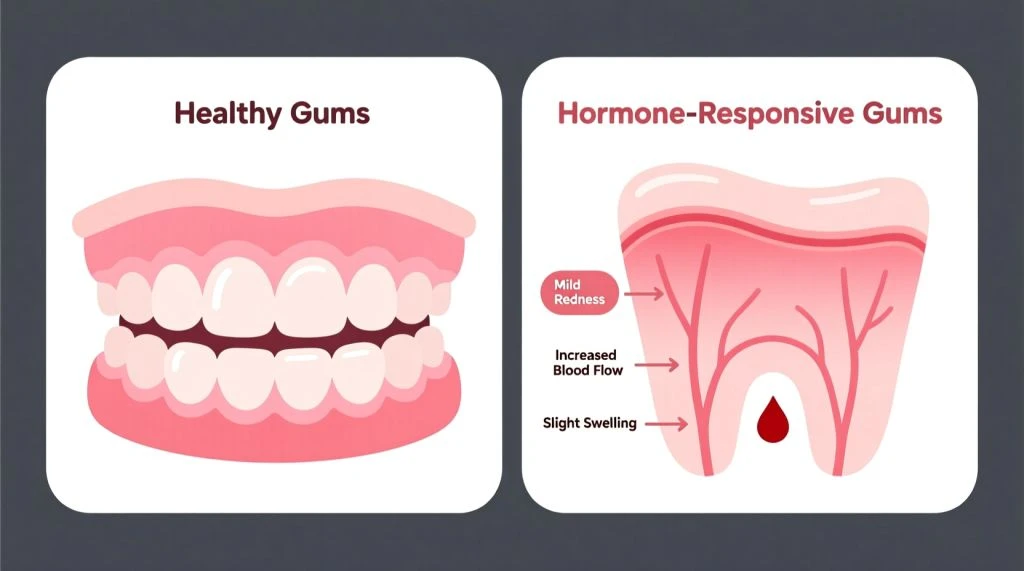
Hormonal changes are a natural part of life, influencing not only our mood and energy levels but also our oral health. The gums are particularly sensitive to these changes due to their rich blood supply and strong immune presence. As hormone levels fluctuate, the gums can become more sensitive, inflamed, or slower to heal. This article explores how different life stages, from puberty to menopause, impact gum health and offers practical advice on maintaining optimal oral care. If you ever need professional guidance, a dentist at Clementi or a dentist near Clementi can provide valuable insights and treatment options.
The Role of Hormones in Gum Health
Gum tissue is highly responsive to hormonal changes because it is rich in blood vessels and immune cells. When estrogen or progesterone levels change, blood flow to the gums can increase, making the tissue more reactive and prone to inflammation. While hormones alone do not cause gum disease, they can amplify the gums’ response to plaque, leading to varying symptoms even among individuals with similar oral hygiene habits.
Puberty: The First Major Hormonal Shift
Puberty marks the beginning of significant hormonal changes, making gums more reactive to plaque. Many teenagers notice red, swollen, or bleeding gums, even if their brushing habits remain consistent. This increased sensitivity is not always a sign of poor hygiene but can be exacerbated by inconsistent brushing, sugary snacks, and orthodontic appliances. Regular dental visits and consistent brushing routines are crucial for managing early inflammation and preventing long-term issues.
Pregnancy: A Time of Extreme Hormonal Changes
Pregnancy brings about some of the most dramatic hormonal shifts, significantly impacting gum health. Elevated levels of estrogen and progesterone increase blood flow to the gums and alter the immune system’s response. Pregnant individuals often experience more bleeding and puffiness, and some may develop small, harmless overgrowths known as pregnancy tumors. Existing gum disease can also worsen rapidly during this period, making regular cleanings and check-ups essential. A dentist at Clementi or any dentist near Clementi can provide safe and effective care throughout pregnancy.
Oral Contraceptives: Mild but Noticeable Effects
Modern contraceptive pills contain lower hormone doses than their predecessors, but some users still notice increased gum sensitivity or bleeding after starting or switching brands. While these symptoms are generally milder than those experienced during pregnancy, they can still be bothersome. If symptoms appear shortly after starting a new prescription, it is advisable to consult both your dentist and your doctor. Consistent plaque control often helps alleviate these issues.
The Menstrual Cycle: Predictable Fluctuations
Gum sensitivity is common in the days leading up to menstruation, with some individuals experiencing slight swelling or tenderness that resolves once their period begins. This temporary increase in inflammation is typically due to hormonal shifts and is not a sign of disease. Gentle but thorough cleaning during these days can help minimize discomfort.
Perimenopause and Menopause: Long-Term Changes
The hormonal changes during perimenopause and menopause lead to gradual but lasting alterations in oral health. Declining estrogen levels cause gum tissue to become thinner and drier, and saliva production often decreases. Dry mouth increases the risk of plaque buildup, tooth decay, and gum irritation. Additionally, lower estrogen levels affect bone density, including the jawbone that supports the teeth. Monitoring gum health and bone support becomes increasingly important during these stages. If you notice dryness, bleeding, or tooth mobility, a visit to a dentist near Clementi can help identify early signs of gum disease or bone loss.
Hormonal Changes and Gum Disease
Gum disease begins with plaque buildup, but hormonal fluctuations can accelerate the progression from irritation to inflammation. During periods of significant hormonal activity, such as puberty, pregnancy, or perimenopause, even small amounts of plaque can cause a stronger reaction. Maintaining good oral hygiene habits, such as brushing twice daily, flossing regularly, and visiting the dentist, is crucial for preventing long-term tissue damage.
Practical Tips for Protecting Gum Health
Consistent daily care forms the foundation of gum health at any age. Brushing with a soft brush, flossing regularly, and scheduling regular dental exams are essential. During periods of increased gum sensitivity, it is helpful to avoid habits that exacerbate inflammation, such as smoking. Staying hydrated is particularly important during menopause when dry mouth is more common. Individuals with medical conditions like diabetes may require closer monitoring, as both hormones and blood sugar levels influence gum inflammation.
When to Seek Professional Help
While it is normal for gums to change with hormonal fluctuations, persistent or worsening symptoms should not be ignored. Signs such as constant bleeding, ongoing swelling, persistent bad breath, or loose teeth may indicate underlying issues. A timely check-up with a dentist at Clementi or another dentist near Clementi can help identify and treat gum disease early, preventing permanent damage.
Conclusion
Hormonal changes are an inevitable part of life, and understanding their impact on gum health can help alleviate concerns and guide appropriate care. By maintaining steady daily oral hygiene practices and seeking periodic professional guidance, you can keep your gums healthy through all stages of life, from puberty to menopause and beyond.
Comments
No comments yet. Be the first to react!